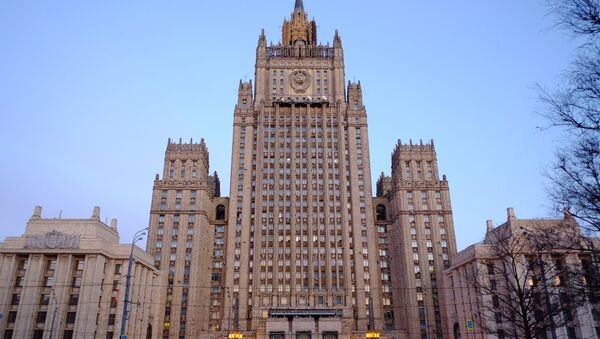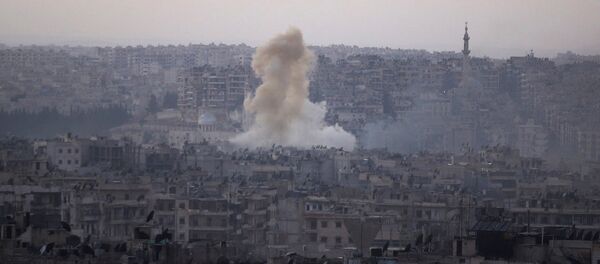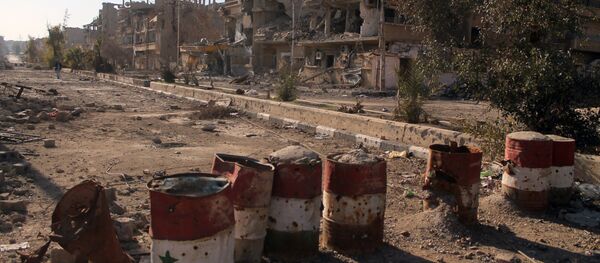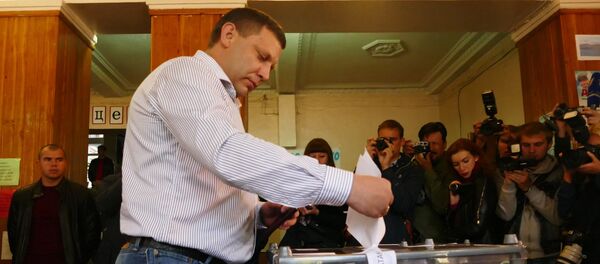"Everybody knows well — that is written in the decision of the UN Security Council — that the regime of cessation of hostilities has never included and will never include Daesh and al-Nusra Front and those who merged with these terrorist organizations," Lavrov said.
"We expect that our ideas, our amendments which we shall pass on after today’s meeting to our French colleagues, will be diligently studied and taken into account," Lavrov said.
"We have seen the plan, the document, we consider that it deserves to be discussed and supported. We note that in response to the request of the European Union, Syrian authorities have given their approval to open a humanitarian office of the European Union in Damascus," he added.
Lavrov stressed that Moscow was unlikely to soften its stance on separation of terrorists from "moderate opposition" in Syria.
"I don’t think Russia would be able to soften any wording."
He underscored that Moscow and Damascus were ready to implement their obligations under the Russia-US deal on Syria.
"Russia and the Syrian authorities are ready to implement their part of the agreements that includes ensuring the ceasefire that was declared and [then] violated by illegal armed groups. That also concerns ensuring humanitarian access, primarily through the Castello Road in full accordance with the US-Russian documents."
Lavrov also expressed regret that the United States suspended cooperation with Russia on Syria.
The Russian top diplomat said Russia considered the EU humanitarian plan on Syria as deserving discussion.
Commenting on the deployment of the S-300 and S-400 air defense systems in Syria, Lavrov said that Moscow had to ensure the security of its troops there. He said the systems did not pose any threat to anyone.
"We simply need to ensure the safety and security of our military personnel…our naval maintenance facility in the port of Tartus at this point while the situation is still extremely volatile," he said.
Speaking about possible German sanctions against Russia over Syria, Lavrov said he hoped commons sense would prevail.
"We have read reports suggesting that the German government is allegedly considering the possibility of imposing new anti-Russian sanctions over the situation in Syria. Of course, it is a matter of the German authorities… First of all, I very much hope that the common sense will prevail, and, secondly, that the aspiration to stabilize the situation in the world, including in Ukraine and the Middle East… will triumph over the desire to blame Russia for everything," Lavrov told reporters after a meeting with French counterpart Jean-Marc Ayrault.
Russia hopes that the US desire to resolve the Syrian crisis by resorting to force will not win, Sergei Lavrov said.
"We are witnessing now that there are people in Washington willing to resort to force [against the Syrian army]. That is not a secret and I hope that they will not win, we heard a rather weighted comment … made by a White House’s spokesperson and hope that it reflects the main line [of the policy] conducted by the [US President] Barack Obama’s administration," he said.
Syria has been mired in civil war since 2011, with government forces loyal to President Bashar Assad fighting numerous opposition groups, as well as terrorist formations, such as Daesh and al-Nusra Front, both outlawed in Russia.
"We have discussed preparations of President Putin's visit to France scheduled for October 19. We hope that the results of the visit would give an additional momentum to the relations between our countries," Lavrov said.
He added that France was Russia's traditional partner and Moscow paid a special attention to relations with Paris.
The talks on France's UN Security Council draft resolution on the situation in Syria are constructive, and there has been a progress, but some obstacles remain, French Foreign Minister Jean-Marc Ayrault said.
"There has been progress on the issue of the resolution, the negotiations are going in a constructive fashion, but there are several obstacles which must be removed in order for the resolution to be adopted," Ayrault told reporters.
The mechanism to control adherence to the Syrian ceasefire must be improved, Ayrault said.
"We must work to improve the mechanism that exists now. Our aim is to ensure an effective mechanism which would allow to examine all cases of Syrian ceasefire violations in real-time."
France's resolution on Syria proposed to the UN Security Council (UNSC) should mention struggle against terrorists without any ambiguity, Ayrault said.
"Terrorism has numerous forms and we fight with the very same means against Daesh and al-Nusra Front. We fight against terrorism without any duplicity, including in Syria. The resolution should mention fight against terrorism in all of its aspects," Ayrault told reporters.
Jean-Marc Ayrault expressed hope that there would be a remarkable progress in the work within the Normandy Format in the coming days.
"The sanctions against Russia exist and they are linked to implementation of the Minsk agreements. In order to achieve that we have a mechanism – the Normandy Format. Owing to that mechanism, we are going to work further and to achieve a big progress in coming days," Ayrault said.
In February 2015, a peace accord was signed between Ukraine’s conflicting sides in the Belarusian capital of Minsk, after talks of the Normandy Four countries, namely Russia, Ukraine, France and Germany.
The deal stipulates a full ceasefire, weapons withdrawal from the line of contact in Donbass, an all-for-all prisoner exchange and constitutional reforms, which would give a special status to the self-proclaimed Donetsk and Lugansk People’s Republics. Both sides of the conflict, however, are constantly accusing each other of violations of the agreements.




